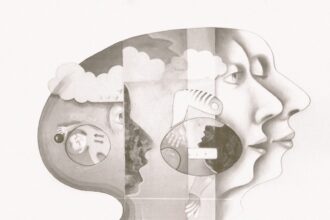Depersonalization is a psychological phenomenon that can leave you feeling detached from your own thoughts, feelings, or sense of self. Imagine looking at yourself in a mirror but feeling as if the reflection staring back at you is not truly you. This disconnection can be unsettling, as it creates a sense of unreality regarding your own identity.
You might find yourself questioning your existence or feeling as though you are observing your life from a distance, almost like a spectator rather than an active participant. This experience can be fleeting for some, while for others, it may persist and become a chronic condition. The experience of depersonalization can be triggered by various factors, including stress, trauma, or anxiety.
When faced with overwhelming emotions or situations, your mind may resort to this defense mechanism as a way to cope. It’s as if your brain is trying to protect you from the intensity of your feelings by creating a barrier between you and your emotional experiences. This can lead to confusion and distress, as you grapple with the reality of your existence and the authenticity of your experiences.
Key Takeaways
- Depersonalization is a mental health condition characterized by feeling detached from oneself or one’s body.
- Derealization is a mental health condition characterized by feeling detached from one’s surroundings or the external world.
- The main difference between depersonalization and derealization is the focus of the detachment, with depersonalization focusing on the self and derealization focusing on the external world.
- Causes of depersonalization and derealization can include trauma, stress, anxiety, and substance abuse.
- Symptoms of depersonalization and derealization can include feeling like an outside observer of one’s thoughts or actions, feeling like the world is unreal or distorted, and experiencing emotional numbness.
What is Derealization?
Derealization, on the other hand, involves a sense of detachment from the external world. You may feel as though your surroundings are unreal or dreamlike, as if you are living in a movie rather than experiencing life firsthand. This can manifest in various ways, such as perceiving objects as distorted or feeling disconnected from people around you.
The world may seem foggy or distant, leading to a profound sense of alienation. You might find yourself questioning whether what you see and hear is genuinely real or merely a figment of your imagination. This phenomenon often accompanies depersonalization, but it can also occur independently.
Derealization can be triggered by intense stress, anxiety, or traumatic experiences. When faced with overwhelming situations, your mind may create this sense of unreality as a protective mechanism. It’s a way for your brain to shield you from the emotional impact of what you’re experiencing.
However, this coping strategy can lead to feelings of confusion and isolation, making it challenging to navigate daily life.
The Difference Between Depersonalization and Derealization

While depersonalization and derealization share similarities in their detachment from reality, they are distinct experiences that affect different aspects of perception. Depersonalization primarily concerns your sense of self; it’s about feeling disconnected from your own identity and emotions. You may feel as though you are watching yourself from outside your body or that your thoughts are not your own.
This internal disconnection can lead to feelings of confusion and anxiety about who you are. In contrast, derealization focuses on the external world and how you perceive it. You might feel as though the environment around you is distorted or unreal, leading to a sense of alienation from people and places that once felt familiar.
While both experiences can be disorienting and distressing, understanding their differences is crucial for recognizing what you might be going through. By identifying whether you are experiencing depersonalization, derealization, or both, you can better articulate your feelings and seek appropriate support.
Causes of Depersonalization and Derealization
| Cause | Description |
|---|---|
| Stress | High levels of stress or traumatic events can trigger depersonalization and derealization. |
| Drug Use | Psychoactive drugs, such as marijuana, LSD, or ecstasy, can induce these symptoms. |
| Psychological Disorders | Conditions like anxiety, depression, or PTSD can be associated with depersonalization and derealization. |
| Brain Injury | Head injuries or neurological conditions may lead to these dissociative experiences. |
The causes of depersonalization and derealization can vary widely from person to person. Stressful life events, such as trauma, abuse, or significant loss, can trigger these experiences. When faced with overwhelming emotions or situations that feel beyond your control, your mind may resort to depersonalization or derealization as a coping mechanism.
This response is often rooted in the brain’s instinct to protect itself from emotional pain by creating a buffer between you and the distressing experience. Additionally, mental health conditions such as anxiety disorders, depression, and post-traumatic stress disorder (PTSD) can contribute to the onset of these symptoms. If you struggle with anxiety or have experienced trauma in the past, you may be more susceptible to episodes of depersonalization or derealization.
Substance use can also play a role; certain drugs or alcohol can induce feelings of detachment and unreality.
Symptoms of Depersonalization and Derealization
The symptoms of depersonalization and derealization can manifest in various ways, often leading to confusion and distress. In depersonalization, you may experience feelings of detachment from your body or thoughts. You might feel as though you are observing yourself from outside your body or that your emotions are muted or nonexistent.
This disconnection can lead to difficulty concentrating and an overall sense of unease about who you are. Derealization symptoms often involve a distorted perception of the world around you. You may feel as though your surroundings are foggy or dreamlike, making it challenging to engage with reality fully.
Objects may appear distorted in size or shape, and familiar places may seem foreign or unrecognizable. These experiences can lead to heightened anxiety and fear, as you grapple with the unsettling nature of feeling disconnected from both yourself and the world around you.
Diagnosing Depersonalization and Derealization

Diagnosing depersonalization and derealization typically involves a comprehensive evaluation by a mental health professional. During this process, the clinician will likely conduct interviews to understand your symptoms better and how they impact your daily life. They may ask about the duration and frequency of your experiences, any potential triggers you’ve identified, and whether these symptoms interfere with your ability to function normally.
It’s essential to provide detailed information about your experiences during this evaluation. The more accurately you describe what you’re going through, the better equipped the clinician will be to make an accurate diagnosis. In some cases, they may also use standardized questionnaires to assess the severity of your symptoms and rule out other mental health conditions that could be contributing to your experiences.
Treatment Options for Depersonalization and Derealization
Treatment options for depersonalization and derealization vary depending on the severity of your symptoms and their underlying causes. One common approach is psychotherapy, particularly cognitive-behavioral therapy (CBT). This therapeutic method focuses on identifying negative thought patterns and replacing them with healthier coping strategies.
Through CBT, you can learn techniques to ground yourself in reality and manage feelings of detachment more effectively. In some cases, medication may also be prescribed to help alleviate symptoms associated with anxiety or depression that contribute to depersonalization and derealization. Antidepressants or anti-anxiety medications may be considered based on individual needs.
It’s crucial to work closely with a mental health professional to determine the most appropriate treatment plan for your specific situation.
Coping Strategies for Depersonalization and Derealization
In addition to professional treatment options, there are several coping strategies that you can implement in your daily life to manage symptoms of depersonalization and derealization. Grounding techniques can be particularly effective in helping you reconnect with reality when feelings of detachment arise. These techniques may include focusing on physical sensations—such as feeling the texture of an object in your hand or listening intently to sounds around you—to anchor yourself in the present moment.
Mindfulness practices can also be beneficial in reducing anxiety and promoting self-awareness. Engaging in activities such as meditation or deep breathing exercises can help calm your mind and create a sense of stability amidst feelings of disconnection. Additionally, maintaining a healthy lifestyle through regular exercise, balanced nutrition, and adequate sleep can contribute positively to your overall mental well-being.
How to Support Someone with Depersonalization or Derealization
If someone close to you is experiencing depersonalization or derealization, offering support can make a significant difference in their journey toward healing. Start by creating an open space for them to share their feelings without judgment. Listening actively and validating their experiences can help them feel understood and less isolated in their struggles.
Encourage them to seek professional help if they haven’t already done so. You might offer to accompany them to appointments or assist them in finding resources that could aid their recovery process. Additionally, educating yourself about depersonalization and derealization can empower you to provide informed support while fostering empathy for what they are going through.
The Impact of Depersonalization and Derealization on Daily Life
Living with depersonalization or derealization can significantly impact various aspects of daily life. You may find it challenging to engage fully in social situations or maintain relationships due to feelings of disconnection from yourself and others. This alienation can lead to increased anxiety and isolation, making it difficult to navigate everyday interactions.
Moreover, these experiences can affect your ability to concentrate at work or school, leading to decreased productivity and performance. The constant struggle with feelings of unreality may leave you feeling exhausted both mentally and emotionally. Recognizing these impacts is essential for understanding how they affect not only your life but also the lives of those around you.
Seeking Professional Help for Depersonalization and Derealization
If you find yourself grappling with symptoms of depersonalization or derealization, seeking professional help is crucial for regaining control over your life. A mental health professional can provide guidance tailored specifically to your needs while offering support throughout the healing process. Remember that reaching out for help is a sign of strength; it demonstrates your commitment to understanding yourself better and improving your overall well-being.
In conclusion, understanding depersonalization and derealization is vital for recognizing their impact on mental health. By educating yourself about these phenomena—alongside seeking appropriate treatment—you can take significant steps toward reclaiming a sense of connection with yourself and the world around you.
In exploring the nuances between depersonalization and derealization, it’s essential to delve into resources that provide a comprehensive understanding of these dissociative experiences. A related article that offers valuable insights can be found on the Unplugged Psych website. This article discusses various psychological phenomena and provides a broader context for understanding dissociative disorders. For more detailed information, you can visit the article by following this link: Unplugged Psych. This resource is particularly useful for those seeking to differentiate between the experiences of feeling detached from oneself versus perceiving the external world as unreal.
LEARN MORE About Unmasking the Mysteries Behind Depersonalization and Derealization
FAQs
What is depersonalization?
Depersonalization is a mental health condition characterized by feeling detached from one’s own thoughts, feelings, and body. It can make individuals feel like they are observing themselves from outside their body.
What is derealization?
Derealization is a mental health condition characterized by feeling detached from one’s surroundings. It can make individuals feel like the world around them is unreal or distorted.
What are the symptoms of depersonalization and derealization?
Symptoms of depersonalization may include feeling like an outside observer of one’s thoughts or body, feeling like one’s emotions are dulled or distant, and feeling disconnected from one’s own identity. Symptoms of derealization may include feeling like the world is foggy or dreamlike, feeling like objects are distorted or changing in size, and feeling like the environment is artificial or unfamiliar.
What causes depersonalization and derealization?
Depersonalization and derealization can be caused by various factors, including trauma, stress, anxiety, depression, substance abuse, and certain neurological conditions.
How are depersonalization and derealization diagnosed?
Depersonalization and derealization are typically diagnosed based on a thorough evaluation of the individual’s symptoms and medical history. A mental health professional may also use specific assessment tools to help make a diagnosis.
What are the treatment options for depersonalization and derealization?
Treatment for depersonalization and derealization may include therapy, medication, and lifestyle changes. Cognitive-behavioral therapy (CBT) and mindfulness-based approaches are commonly used to help individuals manage these symptoms. Medications such as antidepressants or anti-anxiety drugs may also be prescribed in some cases.
Can depersonalization and derealization be cured?
While there is no specific cure for depersonalization and derealization, many individuals are able to manage and reduce their symptoms with appropriate treatment and support. It is important for individuals experiencing these symptoms to seek help from a mental health professional.




